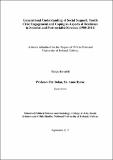| dc.description.abstract | This thesis explores the link between protective factors and youth coping as aspects of resilience within the context of social change. The most recent evidence from resilience research shows there is a significant link between cultural contexts, risk, and individuals’ coping strategies (Gunnestad, 2006; Ungar, 2008). Little research has been carried out on of the collective influence of state and political ideologies on resilience and particularly so in societies that have experienced sudden and rapid socio-political change.
Slovenia is one such example, having undergone rapid socio-political transformation since 1991. This thesis argues that young people in particular have been adversely affected by social change. Once recognised as a privileged and active societal group, young people have experienced increased levels of vulnerability under post-socialism (Ule, 2012, p. 29). Secure and supported pathways to adulthood were a feature of socialism. In contrast, under post-socialism, transitions to adulthood are prolonged and more ‘risky’ (Roberts, 2009). The ways in which these changes have influenced protective factors and the resultant consequences for youth coping has been neither explored nor explained. Through a detailed examination of the link between protective factors (social support and youth civic engagement) and youth coping in Slovenia, this thesis makes an original contribution to the field of youth coping and resilience.
Qualitative data from semi-structured interviews with three generations (socialist, transitional, and post-socialist) provides a valuable comparison of youth experiences of growing up within a context of social change. This research argues that socio-political transformation has had a significant impact on: a) the provision of social support for youth; b) both the organisation and meaning of youth civic engagement; and c) youth experiences with transitions to adulthood. Under socialism, the holistic provision of social support was connected with state-provided social welfare and societal care. These sources of support are no longer available, and more demand is placed on sources of family support.
Diverse socio-political contexts have generated different opportunities for youth civic engagement. The data shows that forms of supported engagement under socialism have been replaced with individualised forms of participation under post-socialism. In this regard, the role of a state versus market provision of opportunities and structures for youth engagement requires special attention. Practices of holistic support and supported engagement in comparison with privatised and individualised engagement have a major impact on transitions to adulthood. Although younger (particularly post-socialist) generations have a wider range of opportunities in the spheres of education, work, and everyday life, the success of transitions to adulthood depends on individual sources and resources. Self-reliance and self-activation become recognised coping strategies when dealing with daily challenges in a post-socialist setting.
Despite different experiences with state-provided opportunities, youth stories across generations can be read within narratives of nostalgia for socialism. This nostalgia is indicative of the extent to which protective factors (e.g. youth civic engagement and social support) are ingrained in societies and cultures, pointing to the significance of the link between individual and societal resilience. In this regard, a strong message for future youth work and youth policies in Slovenia is that strong societal care and equal opportunities for all young people are required for successful transitions to adulthood. | en_IE |


